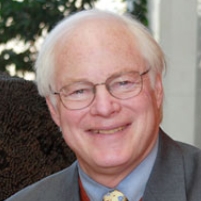Chairman of the National Endowment for the Humanities: Who Is Jim Leach?
Monday, July 20, 2009

President Obama has nominated a Republican, Jim Leach, to serve as Chairman of the National Endowment for the Humanities. If confirmed by the Senate, former Congressman Leach will become the fifth Republican to serve in the Obama administration, joining Secretary of the Army John McHugh, Secretary of Transportation Ray LaHood, Ambassador to China Jon Huntsman, and Secretary of Defense Robert Gates, a holdover from the Bush administration. Unlike the other Republicans, who supported GOP 2008 Presidential nominee John McCain, Leach endorsed Obama for the White House.
Born October 15, 1942, in Davenport, Iowa, Leach won a state wrestling championship in 1960 for Davenport High School, wrestled in college and has been inducted into the Iowa Wrestling Hall of Fame. He earned a B.A. in 1964 from Princeton University (where he became a member of The Ivy Club), an M.A. in 1966 from the School of Advanced International Studies at Johns Hopkins University, and studied in 1967 and 1968 at the London School of Economics without earning a degree. Prior to entering the United States Foreign Service, he was a staffer for then U.S. Representative Donald Rumsfeld in 1965 and 1966, for whom he also worked in 1969 and 1970, at the Office of Economic Opportunity (OEO). While at OEO, Leach shared an office with Dick Cheney. Leach entered the Foreign Service in 1968, and served as a delegate to the Geneva Disarmament Conference and the U.N. General Assembly in 1971 and 1972. In 1973, Leach resigned his Foreign Service commission in protest of the Saturday Night Massacre, when Richard Nixon fired his Attorney General, Elliot Richardson, Deputy Attorney General William Ruckelshaus, and the independent counsel investigating the Watergate break-in, Archibald Cox.
After returning to Iowa, Leach served as a director of the Federal Home Loan Bank Board from 1975 to 1976. He was elected to Congress in 1976 (defeating two-term Democrat Edward Mezvinsky), where he came to be a leader among moderate Republicans. He chaired two national organizations dedicated to moderate Republican causes: the Ripon Society and the Republican Mainstream Committee. He also served as president of the largest international association of legislators: Parliamentarians for Global Action.
In Congress, Leach chaired the House Committee on Banking and Financial Services (1995-2001) and was a senior member of the House Committee on International Relations, serving as Chair of the Committee’s Subcommittee on Asian and Pacific Affairs (2001-2006). He also founded and served as co-chair of the Congressional Humanities Caucus. After 15 victories in a row and 30 years in the House of Represntatives, Leach lost his 2006 re-election bid to Democrat Dave Loebsack of Mount Vernon, IA.
During his 15 terms in Congress, Leach’s voting record was generally conservative on fiscal issues, moderate on social matters, and progressive in foreign policy. As Chairman of the Arms Control and Foreign Policy Caucus, he pressed for a Comprehensive Test Ban and led the first House debate on a nuclear freeze. He objected to military unilateralism as reflected in the Iran-Contra policy of the 1980s. He pushed for full funding of U.S. obligations to the United Nations, supported U.S. re-entry into UNESCO, and opposed U.S. withdrawal from the compulsory jurisdiction of the International Court of Justice in 1986. Leach has the dubious distinction of being a lead sponsor of the 1999 Gramm-Leach-Bliley Financial Services Modernization Act, which repealed those parts of the Glass-Steagall Act which had prohibited banks from offering investment, commercial banking, and insurance services. Some economists, including Nobel Prize winners Paul Krugman and Joseph Stiglitz, have cited banking deregulation as one reason for the sub-prime mortgage crisis and resulting recession, although others have argued there is no connection.
After his defeat, Leach was named John L. Weinberg Visiting Professor of Public and International Affairs at the Woodrow Wilson School of Public and International Affairs at Princeton University, and serves on the board of several public companies and four non-profit organizations, including the Century Foundation, the Kettering Foundation, the Social Science Research Council, ProPublica, and the Carnegie Endowment for International Peace. He is a member of the Council on Foreign Relations and formerly served as a trustee of Princeton University. On September 17, 2007, Leach was named as Interim Director of the Institute of Politics (IOP) at Harvard's Kennedy School of Government after former director Jeanne Shaheen left to pursue a U.S. Senate seat in New Hampshire.
In 2008, Leach broke party ranks to endorse Democrat Barack Obama over fellow Republican John McCain in the 2008 U.S. presidential election. Introduced by fellow Iowan Senator Tom Harkin, Leach spoke at the 2008 Democratic National Convention in Denver, Colorado.
Leach resides in Iowa City, Iowa, and Princeton, New Jersey, with his wife Elisabeth, with whom he has a son, Gallagher, and daughter, Jenny.
-Matt Bewig
Surprise GOP Speaker at Dem Convention: Jim Leach (by Mary Ann Akers, Washington Post)
Major Contributors to Jim Leach’s Reelection Campaigns (Opensecrets.org)
Leach’s Voting Record on Various Issues (On the Issues)
Congressional Votes Database: Jim Leach (Washington Post)
- Top Stories
- Unusual News
- Where is the Money Going?
- Controversies
- U.S. and the World
- Appointments and Resignations
- Latest News
- Trump Deports JD Vance and His Wife
- Trump Offers to Return Alaska to Russia
- Musk and Trump Fire Members of Congress
- Trump Calls for Violent Street Demonstrations Against Himself
- Trump Changes Name of Republican Party





Comments
moreless